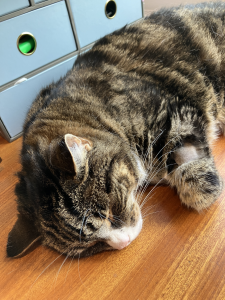Plus working class writers, and the cats of Porto.

The Duoro River flowing through Porto with the historic port cellars on the left, the Ribeira on the right, and the marine layer coming in from the Atlantic over the Ponte da Arrábida.
Hi there,
After a marvellous week off in Porto and a bank holiday yesterday, I’m now back at my desk looking at the apple tree from my office window and thinking about ideas.
Whilst on holiday, I woke up one morning with a fully formed idea for a TV drama, complete with setting, protagonists and some sense of the character arcs. It had sprung from the fragment of a now-forgotten dream, but I wrote it all down and reading it back now, a week later and in the cold light of day, it’s still solid. But, well, will I ever do anything with it?
Ideas are like blossoms on an apple tree: It’s easy for a concept, character or a ‘what if?’ to flower, but only some of them will develop into fruit, and more will fall off the tree before they’re ripe than will end up in your fruit bowl. And that’s OK.
I used to feel a bit bad about all the ideas for books and TV shows that I had, but never properly worked on. Now I just see it as a suite of ideas I can pull from when I next get a gap in my creative schedule. It’s impossible to execute every idea, even every good idea, especially when you’re working a full-time job or running your own business. We’d all be a lot more creative if we had universal basic income, but that’s not currently the world we live in, so all we can do is write as much as we can, when we can.
Pick the apples when they’re ripe and don’t mourn the ones you miss. They all become good compost for next year’s crop.
Opportunity: Galley Beggar’s short story prize
This year’s short story competition from Galley Beggar is now open. With a grand prize of £2,500 and shortlisted entries getting £200, it’s well worth the £11 entry fee. The deadline is midnight, 13 October 2024 (UK time), and they are looking for stories below 6,000 words. The prize is open to published and unpublished writers based anywhere in the world who have a previously unpublished story to enter. (See FAQ for more details.)
Read this: Why now?
Scriptwriter Jack Bernhardt has tackled the question that I suspect all writers dread hearing from a commissioner: Why now?
I’ve always thought it was a stupid question. Why have I written this thing right now, and not, say, last year or next year? Well, largely it’s because it’s the thing that’s in my head right now. The one time I wrote something because I thought it’d be a high-concept, commercial novel, rather than because the story was burning a hole in my brain trying to get out, I ended up writing 110k words about a pandemic just before one actually hit and my MS instantly became unsellable.
But Bernhardt digs into the question from a different and more thoughtful point of view, exploring the interplay between a particular show and the time from which it sprang:
I have to confess, I don’t mind “why now” as a question as much as other writers. There’s something romantic about it, the way it implies that all ideas have their time, that if we could see the expanse of all history every idea could find a year, a month, a day that they could claim as their own.
He goes on to talk about how “why now?” has become degraded as an exploratory question:
The problem with “why now” is that it seems to have morphed into something rigid — it’s no longer a question of how the current era informs one’s idea, but of how one’s idea can encompass everything about the current era. Does this story deal with the key theme of our times (whatever that is)?
Furthermore, culture now changes faster than TV shows can be produced, causing issues for satirical shows and pushing writers to set their shows in the past where they can anchor themselves more solidly to an era.
If you’re wondering “why now”, then now is definitely the time to read this piece!
Read this, two: Working class writers
There was a great conversation yesterday on Bluesky prompted by a post from Ray Newman about his discomfort with calling himself a ‘working class writer’, despite that being what he is.
What I came to realise is that you don’t ever really shed working classness. It’s baked in. It shapes your attitudes to life and your perspective on the world. In the negative sense, the scars are permanent.
[…]
If I experience the slightest financial shock – an unexpected bill, for example – I completely flip out, and revert to being an anxious child. Even if, once I’ve taken a breath and counted to ten, I can easily afford to deal with it.
And there was a second conversation that sprang from a reshare by Ian Martin in which Joel Morris said:
A mate and I came up with the phrase “the chink of departing coin”. You either hear it constantly or you don’t. Telly especially these days is full of characters not driven by it, written by people who’ve never been aware of the chink, which is why they are in a position to write and be on telly.
I watch stuff now and ask “why aren’t these people worried about money?” as almost the first question. Because the audience will be. And they’ll want that reflected on screen. All the best popular stories manage to include it. That noise. Chink chink chink. The meter running down.
Class is a complex thing these days. How you grow up is not always how you live your life, but what you learn as a child can certainly stay with you for life — I’m still picking apart the bad lessons about money that I learnt from my parents.
But, as Joel points out, having money or not is foundational to all of our experiences, and if we’re writing anything based in the real world we really do need to think about how our characters earn a living, and whether they hear the chink of departing coin as loudly as most people do.
Obligatory cat picture
 Last week’s trip to Porto was a delight, and I was particularly happy to see two cats just chilling and doing their thing.
Last week’s trip to Porto was a delight, and I was particularly happy to see two cats just chilling and doing their thing.
I would absolutely recommend a trip to Porto – it’s a fabulous city, full of character, amazing port wine and muscatel, fabulous food and some glorious old buildings many of which are decorated in exquisite tiles both inside and out. But if you do plan to go, get a few weeks of hill repeats in before you fly. Those steep hills brutalised my calves and they still haven’t fully recovered!
Finally, for those of you following Grabbity’s health issues, she’s now largely rejected the second brand of renal kibble, though will eat it under pressure. Copurrnicus, on the other hand, loves it, so I’m constantly trying to feed her on her own, which is easier said than done. So I’m off to the vet’s at lunchtime to see what renal soft food they’ve got.
Overall, she’s a much happier cat now her problem teeth have gone. And once we’ve got her diet settled, we’ll move on to sorting out her arthritis.
Cheers for now!
Suw
{ Comments on this entry are closed }







